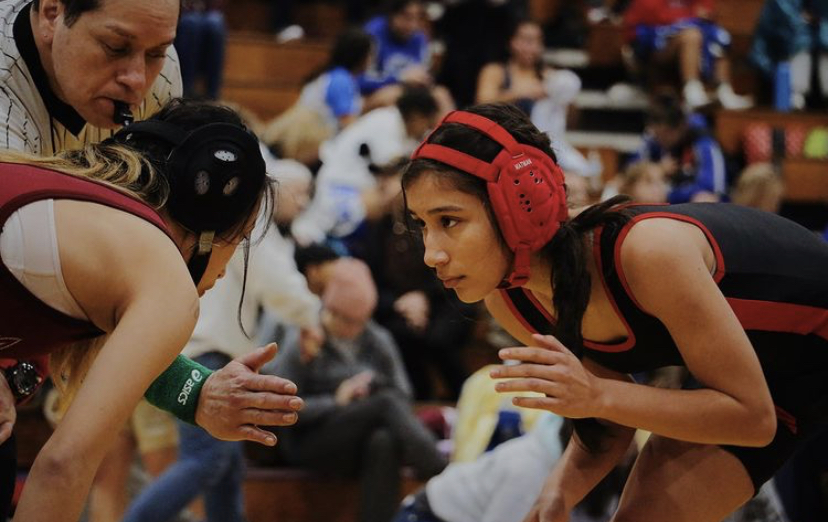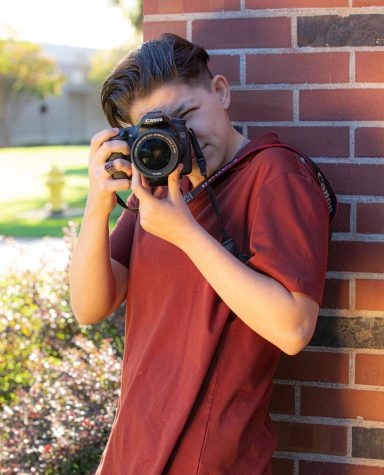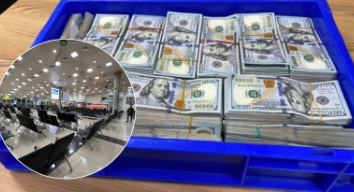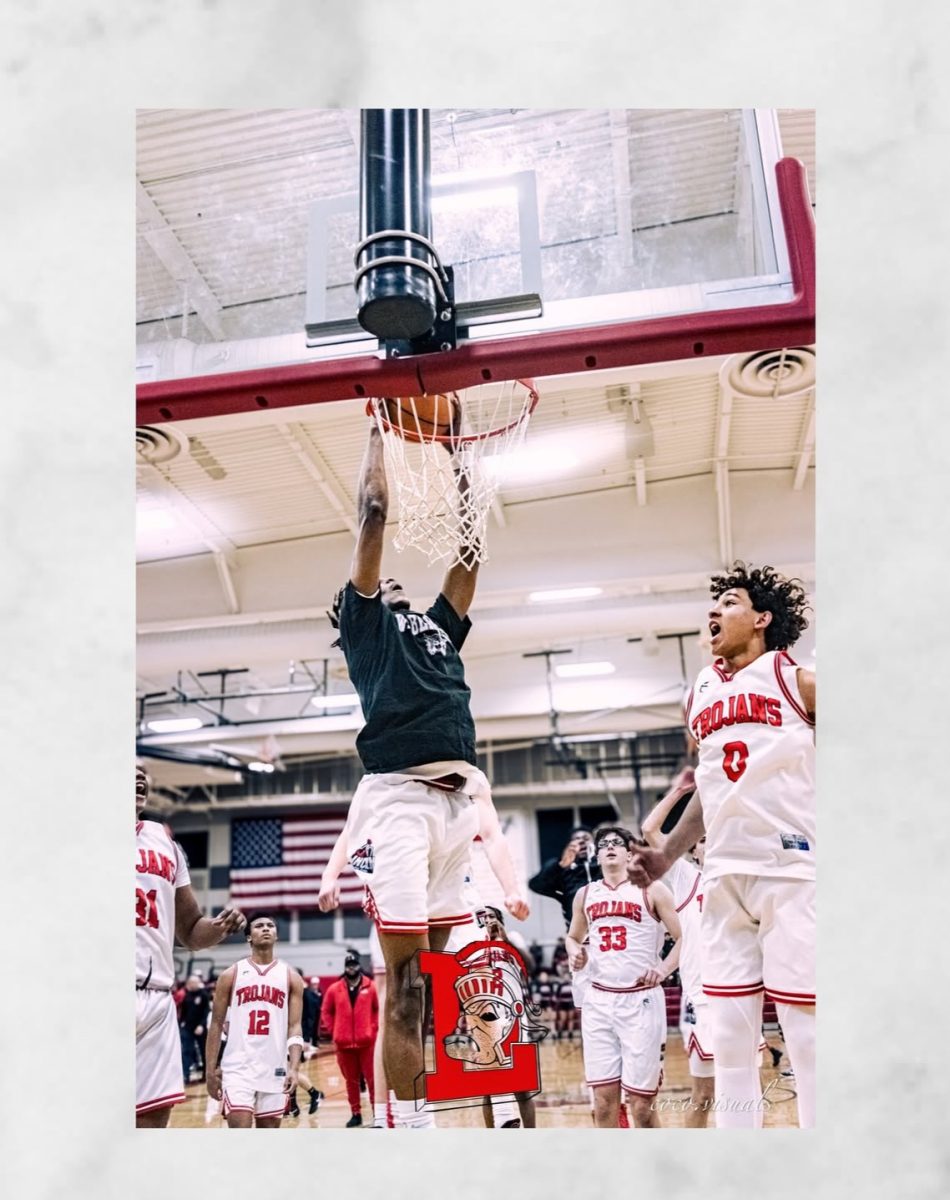To Bubble or Not to Bubble
What will the start of the 2020-21 high school athletic season look like for the Trojans under the cloud of COVID-19?
Photo courtesy of Alana Luman @lananation
Aaliyah Montantes showcases her talents during the 2020 Lady Tigers Wrestling Invite.
January 22, 2021
As we finally say goodbye to a forgetful 2020 and prepare for the opening of hopefully a brighter 2021, our Trojan athletes are simultaneously getting anxious about the beginning of their sport seasons. However, if the professional sports leagues and the NCAA are any precursor to the challenges that COVID-19 will present to high school athletics, then there is no doubt that there could be some stumbling blocks in the re-opening of high school sports in 2021.
The battle of sports vs. COVID-19 officially began on July 23rd, when Major League Baseball re-opened its 2020 season. MLB recorded 111 positive cases of COVID which saw 43 games either postponed or cancelled. The playoffs and World Series were both played in a limited “bubble” in Arlington, Texas that cost the league $100 million dollars to execute. Globe Life Field became “home” for 16 teams, as the 30-day playoff format would eventually crown the Los Angeles Dodgers as 2020 World Champions. The Dodgers defeated the Tampa Bay Rays four games to two, but the celebration was tarnished as Dodgers 3rd baseman, Justin Turner, tested positive for COVID-19 in the middle of the game and was pulled from the game in the 8th inning. “We’re glad to be done,” MLB Commissioner Rob Manfred said. “I do think it’s a great accomplishment for our players to get this season completed, but obviously we’re concerned when any of our players test positive. We learned during the game that Justin (Turner) was positive and immediately isolated him to prevent the spread.”
The most famous summer “bubble” was Adam Silver’s NBA bubble created inside the ESPN Wide World of Sports Complex at Disney World. 22 of the 30 NBA teams participated in completing the 2020 regular season which started on July 30th with no fans. The playoffs began on August 17th and ran through October 12th with the Los Angeles Lakers winning their 17th NBA championship against the Miami Heat. Strict health protocols were followed from start to finish. For example, as soon as a team lost their respective playoff round, they were immediately escorted out of the bubble and taken to the airport. Arriving family members that came to watch the playoffs, were required to self-quarantine in a separate Disney hotel for 14 days before being let inside the “inner” bubble. In the 77 days that the NBA called Disney World home, there were zero COVID-19 positive tests. The $180 million dollars and strictly followed protocols kept players, coaches and staff healthy and safe. “The pride of the sense that we’ve accomplished this against many obstacles,” Adam Silver said, “and at a time also when I think people needed to see this.”
With the NFL entering the final month of its season, pro football has handled COVID-19 with protocol guidelines only. As week 20 is about to be played, the league has announced 218 positive COVID-19 (140 staff and 78 players) cases. Now, all games have been played thus far, but 18 games had to be moved because of COVID outbreaks. Depending on local and state guidelines, NLF stadiums have been empty or have only been allowed to have 20% capacity for fans. The league had discussions with the NFLPA about establishing a bubble for the playoffs, but a final plan never materialized. Super Bowl LV is scheduled to be played on Sunday, February 7, 2021 in Tampa, Florida.
The NCAA football season has had many COVID issues to deal with as well. The first issue was when to officially start the season. Each conference had to deal with different university president philosophies and doctor recommendations in order to create safe guidelines to play football under COVID-19 protocols. As a result, the Power 5 conferences faced different health interpretations and had three different season starting times. Three conferences opened in September, one in October and one in November. This was all with the belief that the NCAA championship game will still take place on Monday, January 11th. There have been 97 game cancellations due to COVID and many prominent coaches like legendary Lou Saban of Alabama have been sidelined from coaching games because of testing positive for COVID-19. In fact, Saban has tested positive twice this season and he did not participate in the game week preparations for the Iron Bowl against Auburn. “We hated that this situation occurred, but as I’ve said many times before, you got to be able to deal with disruptions this year, and our players have been pretty mature about doing that,” Saban said. “We just want to carry on the best we can. They’ve (Auburn) got a very good team and they’re playing really well right now, so it will be a challenge for us. We’ve just got to have great preparation and put our players in the best position to be successful.” Finally, the NCAA basketball season has gotten off to shaky start as well. In the first month of the season, top 25 programs like Gonzaga, Baylor, Duke, Kentucky and Louisville have all had to postpone games. Even our local Pacific Tigers had a COVID outbreak and the men’s team was shut down for two weeks from December 4th to December 18th.
So where does this leave the state of high school athletics? The examples above were shared because the amount of money being spent to fight against COVID-19 in order to play games is astonishing. Professional sport leagues and the NCAA have serious monetary incentives to play games. Television contracts that produce $800 million for NCAA football, $2.6 billion for the NBA and $3 billion for the NFL almost guarantee that games will be played no matter what the health conditions are. Realistically, high schools just simply don’t have the funds to create a quarantined bubble, or test athletes for COVID on a daily basis. COVID tests run in the neighborhood of $125 apiece. Therefore, is wearing a mask, practicing good social distancing habits, and working out in pods enough to allow our Trojan athletes to have a season?
The CIF officially delayed the start of the 2020-21 high school season on December 1st. With the state of California surging into the purple tier, the start of high school athletics was paused until January 25th. The CIF will release new guidelines during the month of January, as schools prepare re-open for second semester. Other challenges facing our student-athletes and coaches are practice space and transportation. The condensed sport seasons mean that multiple sport teams will be on campus at the same time. Luckily, Lincoln has two gyms and multiple practice fields. The practicing of quality social distancing protocols will be key in maintaining safe health. Another hurdle to jump over will be the transportation of our athletes to away games. Will there be enough buses? Condensed sport seasons means more sports are being played at the same time and this will create an extra demand for the number of buses needed to get our athletes to game sites. A normal 24 seat school bus can hold 48 students. COVID protocols will call for only 50% capacity and this will be just one more worry for coaches to execute properly in order to keep student-athletes safe.
In the end, our Trojan student-athletes just want to get out on a court, on a field, on a track or in a pool to compete. COVID-19 has put a stranglehold on high school student-athlete careers for 10 months now. The Spring 2020 seasons were abruptly cancelled and dreams were crushed. It would be an incredible shame for some very deserving young people that the access to money just might be the final dagger that keeps our Trojans from competing in 2021. I can only hope that Governor Newsom and our state legislators are thinking about the 800,000 future voters in this state when making a final call on the 2020-21 season.
Update – January 22, 2021:
- Lincoln High School student-athletes must now wear masks during the entire duration of conditioning and practice.






